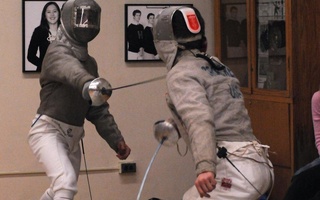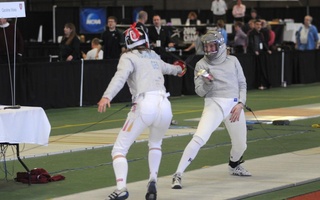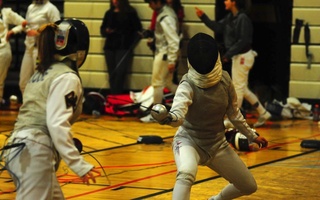
Freshman Alexander “Sasha” Ryjik will be following in his father’s footsteps as he takes to the international stage. But, unlike his father, Sasha will be sporting red, white and blue.
For many individuals here at Harvard and outside its gates, the mention of the sport of fencing is likely to conjure up images of Pirates of the Caribbean, swashbuckling pirates, high stake duels to defend honor between European nobles, and a masked fighter named Zorro. However, for Crimson freshman Alexander “Sasha” Ryjik, fencing is something greater than its modern media portrayal; it is a grueling sport “like a chess game and boxing match put together,” Ryjik said, that has become a defining part of his life.
As an early entrant into the sport, Ryjik, who began fencing at the age of eight, has nearly a full decade of training and experience under his belt—experience that has served him well on the national, club, and collegiate fencing circuits.
But this week, Ryjik will be given a unique opportunity that few student-athletes are ever given in their athletic careers: the opportunity to compete while wearing his nation’s colors at the international level. Ryjik will be representing the United States at the 2012 World Cadet and Junior Fencing Championships in Moscow, Russia.
As one of the premier events in international fencing, the Junior World Fencing Championships, is held every year in the spring and serves as the headline fencing competition for young fencers across the globe. Each year, approximately 1300 under-19 athletes from roughly 80 nations take part in the championships. Fencers are broken up into age groups: entrants between ages 17 and 19 form the junior class while those under 16 form the cadet class.
Having participated in two previous world championships in the cadet class, Ryjik this year will enter into the Junior World Championship for the chance to bring home international glory. But Ryjik’s international aspirations do not end with this year’s world championships in Moscow.
Historically, the Junior and Cadet World Championships have been instrumental in the rise of a number of future stars of international fencing. Amongst the alumni of the event are a number of Olympic and World Cup medalists.
And as an ambitious and already accomplished fencer himself, Ryjik hopes to do the same. Ryjik, the current number one fencer in the 19-and-under age group for the United States, sees his fencing career eventually passing through the sunny beaches of Rio de Janeiro.
“People often ask me if I’m going to make the Olympics,” Ryjik said. “I definitely can’t make the London Olympics this year, but I’m hoping to make the 2016 Olympic team in Rio.”
But even with a little over four years before the Rio games, Ryjik is firmly aware of the sacrifices involved in attaining Olympic glory.
“I still have a lot of decisions to make for [the Olympics], though,” Ryjik said. “I’ll probably have to take a year off from school in order to focus on making the Olympic team, so I’m not sure how everything will play out.”
Though the presence of an Olympic fencing aspirant on Harvard’s campus may come to many as a pleasant surprise, a quick look at Ryjik’s personal background and history reveals that in many ways his life story has been building up to a potential Olympic berth.
For Ryjik, fencing is not just a sport he casually stumbled into. Rather, it is a sport that runs deep in his veins. Sasha is the son of former Soviet national champion fencer Alexandre Ryjik.
“Those days were not the easiest days to be a Soviet athlete and he left Russia and came here in 1991, right after the fall of the Soviet Union,” Sasha said. “Today, my father is probably one of the most patriotic individuals [I know], to this country of course.”
However, Alexandre not only inspired his son to take up fencing, but also molded Sasha into the fencer that he is today. As Sasha related humorously, his father’s involvement in his fencing career was probably planned upon his birth but truly began at the age of eight, when he first picked up the sport.
“Although I’ve worked with several people ever since I started, including my current coach Peter Brand, my father has essentially been my permanent coach,” Sasha said.
In addition to training his son, Alexandre’s fingerprints on his son’s fencing
career are found even on the weapon in his son Sasha’s hands. Alexandre, during his time as a Soviet athlete, fenced with the sabre, one of three weapons used in competitive fencing along with the foil and epee. His son, Sasha, fences the sabre as well. Asked about his weapon, Sasha attributed his choice of the sabre to his personal taste.
“I originally started with the foil, but I didn’t like it,” Sasha said. “I thought that it was a little too slow paced. Foil is the regular starting weapon for all fencers, but if a fencer feels that the foil isn’t their fit, then a fencer branches off to either sabre or epee. I chose sabre around nine years old, and I’ve stayed with it ever since.”
“But yes, it could also be genetic,” Sasha conceded with a laugh.
After just one year at Harvard, Ryjik has already made a mark in his collegiate career. In his freshman season, Ryjik took fourth place in the sabre at the Garret Open hosted by Penn State, finished 10th at this year’s Ivy League Championships, and qualified for the 2012 NCAA Championships following a 12th-place finish at the NCAA Northeast Regional event held at Boston College.
“This season I’ve fenced a lot, and I’ve made a lot of contributions to the team,” Ryjik said. “So far though, I’m not entirely pleased with my results in competitions this year. But it is my freshman year.”
One of the difficulties Ryjik feels that he faced in his first year of collegiate fencing was the struggle to adjust to a new competitive format. Unlike the international, national, and club circuits, which feature 15-touch bout matches, collegiate fencing format centers around five-touch bout matches.
“The competition style is different, and that takes time adjusting to,” Ryjik said. “But this year, I’ve definitely started adjusting to the change in format and I think that by next year, I’ll be ready to take it to the next level.”
Despite the challenges faced by the future Pfoho resident in his rookie season, Ryjik has already won the respect of many of his current Harvard teammates, including current Crimson captain and 2012 NCAA Fencing Championship runner-up, Valentin Staller. For Staller, Ryjik has already emerged as a leader on the team.
“Sasha is a really great fencer,” Staller said. “He works extremely hard at it. He’s thoughtful about his fencing. So he’s fantastic to have around practice. Sasha keeps everyone accountable, which is really invaluable for a team.”
“Sometimes, individuals on teams are reluctant to give constructive criticism to teammates, but Sasha definitely has the interest of the team on his mind constantly,” Staller adds. “I think he could very well become a captain one day, but that obviously depends on how he conducts himself for years to come.”
While looking towards the immediate future and the Junior World Championships, Ryjik expressed his excitement and the deep honor he felt to have the opportunity to fence for the United States.
“What I really love about world championships is the opportunity to represent your country,” Ryjik said. “You feel great, you get those USA warm-up clothing, you walk around with your team, you think that you are hot stuff, and then you get to have fun with your teammates. Also, what I really love is the mutual respect that each of the national teams have for one another. Everyone understands the work that everyone has put in in order to make it there.”
“Even if I don’t do well, it won’t be the end of the world,” Ryjik adds. “Because I have next year. But this year, I’m definitely looking to have a strong finish. I’m going to put 100 percent of effort into it.”
—Staff writer Oluwatoni A. Campbell can be reached at oluwatoni.campbell@college.harvard.edu.
Read more in Sports
Women's Lax Looks To Turn Year AroundRecommended Articles
-
Women Bounce Back To Win PairThe men's fencing team (8-5) finished its last day of matches with two wins, defeating Air Force, 17-10, and Haverford, 23-4, while the women also swept the same opponents, 24-3 and 21-6.
-
 LIVE BLOG: NCAA Fencing Championships
LIVE BLOG: NCAA Fencing Championships -
 Vloka Gets Back At Foe
Vloka Gets Back At Foe -
The Full-Court Press: Valentin Staller '12Meet junior Valentin Staller. As a Harvard fencer, Staller had never won an Ivy League championship. But last weekend Staller ...
-
 Fencing Delivers Strong Showing at Northeast Regional Championships
Fencing Delivers Strong Showing at Northeast Regional Championships -
Fencer Valentin Staller Finishes Second at NCAA ChampionshipsThe Harvard fencing team capped off its season with a sixth-place finish at the NCAA Championships over the weekend in Columbus, Ohio. Co-captain Valentin Staller was among six All-Americans for the Crimson and led the team with a second-place finish in the sabre.













